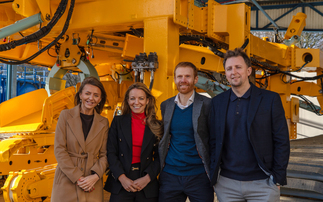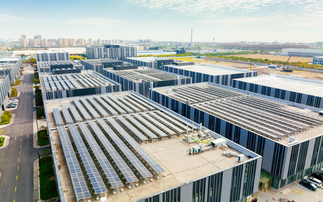Schroders investment experts explain what impact the pandemic has had on sustainable investing and what it means for the future
Sustainable investing is not just about a company's financial success, but how it achieves that success. The importance of considering all stakeholders is intrinsic to the approach.
Those stakeholders range from employees to shareholders to wider society. The Covid-19 pandemic has shone a spotlight on how companies treat their employees, protect their customers, and help guide their suppliers through a time of crisis.
With vaccines on the way, the effects of the pandemic should - hopefully - start to fade. Below, three of Schroders' sustainable investors offer their thoughts on how the pandemic has changed the conversation around sustainable investing, and what they expect the long-term impact to be.
Has the pandemic changed how you, as investors, speak to companies?
Nicholette MacDonald-Brown, Schroders' head of European blend (NMB): "As sustainable investors, our engagement with companies for a long time now has included questions about how they treat all their stakeholders. But if I think back to the 2008 global financial crisis, the conversations then were very different to the conversations we're having now. Back then, it was all about profit margins and balance sheets whereas now those things are discussed in partnership with the treatment of employees and suppliers."
Katherine Davidson, Schroders' global and international equity portfolio manager (KD): "The dialogue has changed between investors and companies. ESG (environmental, social, governance) concerns used to be mainly discussed in terms of the 'E' but this year it's become very clear that the social aspect is just as important. This is a broad conversation that's happening in the media and wider society as well. How companies treat their staff, manage their supply chains and keep their customers safe is not solely of interest to investors."
Will this focus on sustainability last?
NMB: "I think it will last and in simple terms it's largely down to investment performance. The relative success of sustainable funds this year is very important because it was their first big test. This shows that sustainability isn't a ‘luxury' that investors can only afford to think about in the good times; it's crucial in tough economic times too. Looking just at the European benchmarks, the MSCI Europe ESG leaders index returned -1.9 per cent year-to-date compared to -5.6 per cent for the broad MSCI Europe index (source: Morningstar, as at 30 November 2020). For me, this shows the sustainability debate will persist."
Saida Eggerstedt, Schroders' head of sustainable credit, (SE): "I think the pressure for companies to demonstrate good practice has gone up. After all, there is plenty of choice for investors: the economic difficulties of this year have seen many companies seek new funding by issuing debt or equity. Investors can therefore be selective. Let's not forget the role of governments and regulators in this too: many companies have sought some kind of state support, whether via loans or access to furlough schemes. Governments want to see high standards from companies in terms of social and environmental behaviour if they are going to get state help and this will extend beyond the current crisis."
KD: "We're starting to call it a new social contract, in that a company's place in its community and wider society is changing. This is important for clients too. The latest Schroders Global Investor Study showed how people expect companies to prioritise the actions that have an impact on the wider environment and society."
How have companies reacted to questions about sustainability?
SE: "In some ways, the sharp market falls in the early days of the pandemic offered a good opportunity for investors like us to engage with companies over their response. It can be easier and more effective to press for best practice or greater transparency at a time of crisis, rather than when everything seems to be going well."
KD: "One of the positives of the crisis is that it has enabled us to start engaging with companies who previously hadn't seen the business case for sustainability. This year, capital markets have rewarded companies that are active on sustainability issues. We've also seen customers vote with their feet and brand perceptions fall if a company is seen to be a ‘bad actor' in the crisis. This is the kind of thing that gets noticed by senior executives."
NMB: "As an investor in Europe, I'm fortunate that many of the companies I speak to are already thinking about sustainability issues. But it still gets their attention if I say that doubts over a sustainability issue make a company less investable, in the same way as doubts about their profit margins. What's also very interesting is that we're starting to see companies come to us and ask for advice about best practice on sustainability. The recognition that companies should put sustainability targets alongside financial targets is definitely growing."
Do you think clients will increasingly seek out sustainable investments?
KD: "The pandemic has caused a lot of people to consider their values and what is most important to them. This has big implications for investing. For example, our latest Global Investor Study found that 77 per cent of retail investors won't invest in something if it's against their personal beliefs."
NMB: "There's often a misconception that there's a narrow audience for sustainable products, or that only young people are concerned about sustainability. Perhaps that used to be true but it's certainly not now. More traditional investors like insurance companies also care about sustainability and are starting to drive the conversation. The growing evidence that you can achieve your investment goals without compromising your beliefs is crucial in this regard."
Where do you see sustainable investing opportunities in the wake of Covid-19?
NMB: "There are certainly plenty of opportunities for returns. We could look at those companies that have been left behind because any thought of their long-term prospects has been overwhelmed by the virus and lockdowns. And from a sustainability perspective, this kind of crisis is exactly when companies need their investors. So we should still be demanding in terms of sustainability targets."
SE: "It's also encouraging to see the stimulus coming from governments in terms of recovery from the crisis. We are seeing many countries issue green bonds or social bonds. These are long-term commitments which are designed to address environmental issues, promote jobs growth and improve resilience in the face of any similar future crisis."
KD: "And I think there's a real opportunity for us as active investors, who can choose which companies we invest in, to keep the pressure on and make sure sustainability remains high up the agenda as the recovery comes through."
Schroders is a partner of the Net Zero Festival. Read more Sustainability insights from Schroders here.







